Urszula Gawronek Poczwa
Urszula Gawronek Poczwa celebrated her 90th birthday on 12 June 2016. She still exudes such
energy, one can easily imagine her as a teenager regularly crossing a frozen Russian river under the noses of NKVD guards, or
jumping in a swamp from one cranberry bush to another.
Marian Ceregra introduced us. President of the Stowarzyszenie Polskich Kombatantów w Nowej Zelandii (Polish Combatant’s
Association in New Zealand), Pan Marian heard of my research for this website and thought Pani Ula would be a good
interviewee. He was correct. Always generous with her time, her memories—and her Polish baking—that meeting
became the first of many.
I hope this story captures Pani Ula’s zest for life even in circumstances that, for Poles in the USSR during World War II,
were often precarious.
Pani Ula’s story is written within the context of what happened to Poles in eastern Poland after the invasion by Russia on
17 September 1939 and the subsequent forced removal of an estimated 1,700,000 Polish people to prison and labour camps in the
USSR. Spending time with her made me realise that this was “only” another page in her life. She had had to grow
up quickly when her mother, Henryka, died five years before the 1939 Russian invasion of Poland.
My appreciation, thanks and best wishes to Pani Ula, a strong spirit and woman I admire.
—Basia Scrivens
HUNGER KNOWS NO FEAR
by Barbara Scrivens
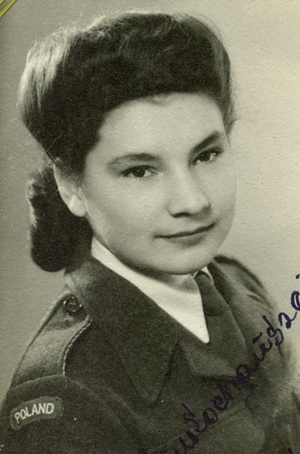
Security gates were not needed at the Soviet forced-labour facility holding Urszula Gawronek and her family in 1940 and 1941.
Its proximity to the Arctic Circle meant certain death for anyone escaping during the long winter when temperatures regularly dipped to minus 40 degrees and often to more than minus 50 degrees.
Wild mushrooms and berries may have sustained a person in the summer, but bears roamed the dense taiga forest.
In any case, even if Urszula or any of the other detained Polish families had managed to escape, they had nowhere to go—Russians occupied eastern Poland and their homes in the Polesie province, and German invaders still occupied the western side of the Molotov-Ribbentrop boundary through central Poland.
Urszula remembers the facility’s name as Uspieniga,1 number 45 “at the very end of the railway track on the river Dwina.” Their arrival continued an ordeal that started weeks earlier—in the early hours of 10 February 1940—when Soviet soldiers woke the family, demanded at gunpoint that they gather a few possessions, and accompanied them to a cattle train waiting at the main railway station in Brześć nad Bugiem.
“They took us to Siberia,2 close to Archangielsk. When there was no more rail, they put us on buses.”
Urszula was 13 years old. She knew they were close to the mouth of the Dwina because of its width. Their group made “quite a crowd,” mostly families with children of varying ages and grandparents, packed into at least six large buses that had to be dug out of the snow several times before they stopped at the edge of a forest.
She had no idea that… more than 200,000 other Poles living in eastern Poland… were arriving at similar destinations all over the USSR.
As far as Urszula was concerned, it could not have been farther from her home in Stawy. She had no idea that on that same February morning, more than 200,000 other Poles living in eastern Poland had shared similar experiences and were arriving at similar destinations all over the USSR. She soon found out that the facility was run by the NKVD, the People's Commissariat for Internal Affairs, also known as the Committee for State Security and precursor to the KGB or Soviet Secret Police.
Poles had lived under Siberia’s menace and shadow for many decades. The name became associated with sudden disappearances of people who annoyed Russian heads of state. A year before the Russian Empire partitioned and occupied Poland for the third time in 1795, “exile” to the depths of the USSR became a way of removing troublesome Polish nobles from spreading their revolutionary ideas of “liberty, equality and fraternity.” 3 During the 1830 and 1863 Polish uprisings against their Russian occupiers, and in the early 1900s, Russian authorities rewarded hundreds of rebellious Poles with banishment to Siberia. Enough came back to tell of the dire conditions and punishing work in the political prisons.
At the outbreak of World War I, some parts of Poland had already spent 142 years under the partitioning powers of Russia, German Prussia and Austro-Hungary. The German army conscripted Urszula’s father, Michał, when he was 17 and living with his family in Poznań, within the Prussian partition of Wielkopolska.
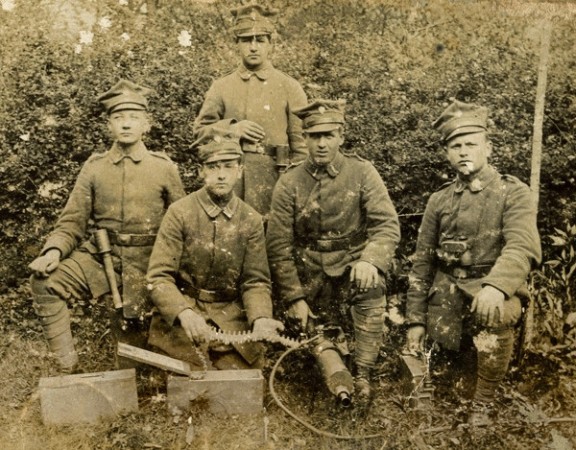
Michał Gawronek (back) with four of his five brothers. All survived the war.
After the German defeat—and while Treaty of Versailles delegates argued about borders—Michał volunteered for the Powstańcy Wielkopolscy Organizacja (Greater Poland Uprising). He was among thousands of Poles who felt strongly about not allowing the Germans to keep a previously partitioned area that retained a strong Polish identity, even after so many years of severe Prussian authority and extreme restrictions against its Polish residents.
Clashes between the Polish and German soldiers continued until January 1920 when Treaty members again put the Wielkopolska region inside the Polish border.
_______________
Poland’s eastern borders proved more problematic. The Treaty of Versailles omitted to make a definitive determination, leading to a series of battles during 1919 and 1920 between Warsaw and Moscow that became known as the Polish-Soviet War.4 Poland emerged victorious and the Treaty of Riga ratified the Polish-Soviet boundary in March 1922. The fledgling Second Polish Republic (Rzeczpospolita Polska) had little cash but unused land in the east—finally won back—became something tangible that the new government could offer the nearly 11,000 soldiers and volunteers who had rallied at a time of crisis.
The men appreciated the gesture. For many of them owning a piece of land provided an opportunity to improve their lives, an opportunity few of them would have had if they had returned to their home villages, towns and cities.
It was not a completely altruistic gift. The government land seldom came with any type of infrastructure and consisted of areas between existing villages populated primarily with Ukrainian and Białorusini (white Russian) peasants who still used primitive farming methods such as keeping bees in hollowed-out logs. Urszula remembers her father encouraging the “very poor” Ukrainian villagers to create vegetable gardens around their houses.
It was in the interests of each man to become established as quickly as possible… as their tax moratorium generally lasted only two years.
The former soldiers needed to improve the land or lose it.
Although Poland was an agrarian country, many of the young soldiers came from towns and cities and had no farming experience. Fellow farmers often came from the same military units and several would have known one another, but how lonely would it have been in the beginning without family and friends from “home”?
The so-called military settlements, known as osady or kolonie, consisted of several blocks of land averaging 20 to 38 hectares each. With their tax moratorium generally lasting only two years, it was in the interests of each man to become established as quickly as possible and repay government loans for building materials.
Having reliable settlers scattered along its new eastern provinces and border with Russia allowed the new Polish government to put its energies into building a new nation rather than borderland security. Individual settlements created informal border patrols that dealt with the Bolsheviks’ continuing sporadic raids.
The Stawy kolonia consisted of 29 farms. Uszula remembers many of the men had war wounds. One man had lost a leg, another his fingers and Urszula’s father carried a bullet in his shoulder until he died.
Urszula described the piece of land that Michał received as “swampy, a wood… nothing there to make a living.”
“Fortunately my father finished agronomy school. He knew what to do with the land and that’s why he was quite rich in the end. We had horses, cows, pigs, wheat and rye and corn for winter animal feed. He even put in cherry and apple trees. Now it’s all gone.”
_______________
Michał became a marked man in 1939.
Stalin considered all the recipients of land such as Michał’s, as enemies of the Soviet state. The NKVD catalogued their names and addresses and earmarked them to become part of Stalin’s Five-Year plans, absorbing them into a scheme sometimes called “Labour for Bread.”
The Polish Army recalled Michał the Easter before the German invasion on 1 September 1939 and he was not at home when the Soviets invaded eastern Poland on 17 September—or when Russian soldiers killed the farm’s cows and pigs and took away his horses, Urszula presumed to be used in the war.
She remembers clearly how one night, her father’s favourite horse, Kasztan (Chestnut), woke her by crying with grief (żal) at the window of their home. Dishevelled and with ragged saddle-marks on him, Kasztan, the core of her father’s horse-breeding enterprise, had escaped captivity and found his way home.
“When my father had extra money, he would go to a stable of race horses to buy horses or choose a stud.” Urszula remembers Michał having a way with horses and never begrudging money he spent on them.
“Kasztan was special, obedient and so good to sit on, wide and comfortable.” She smiles at the memory.
“Thank goodness… that she had the courage to walk among the men and whisper to them to run away or they would be killed in some way. She knew what awaited them.”
Michał was at home by sheer chance the morning the Soviet soldiers came banging at the farmhouse door. Captured after the invasion, he was walking among a column of Polish prisoners near Minsk (now in Belarus) when a young Russian woman soldier slipped among them and, while pretending to be checking up on them, kept whispering, “If you’ve got children, run away, run away… you have to flee or you will be killed.”
Urszula heard her father repeat the story often.
“Thank goodness for her, that she had the courage to walk among the men and whisper to them to run away or they would be killed in some way. She knew what awaited them. My father didn’t need to be told again—he was an old soldier!” At the first village he got to, people gave him civilian clothing, shelter and food, and by Christmas he had made his way back home to his expanding family and Kasztan, the only animal left at the farm.
Urszula and her two siblings were pleased to have their father home for another reason: They were not looking forward to spending Christmas with their stepmother, Maria.
Urszula’s mother, Henryka, died in an accident in 1934 leaving Celina, nearly nine, Urszula, eight and Zdzisław, two years old.
Urszula recalls how her parents were in the family carriage on a frosty November when—to break the ice and get the carriage going—Michał whipped the horses. They jumped, the carriage wobbled, Henryka, was thrown into the ditch, hit her head, and died instantly. She was 28, 11 years younger than her husband.
They had met during the on-going battles after 1918 Henryka’s father, a wealthy Warsaw landowner, hid Polish soldiers in his fields.
“She was very young—only 15—a very young girl who fell in love with a soldier. She ran away from school and her father and mother disowned her but let her stay with them until she was 16 and allowed to get married. She didn’t even have a proper wedding, just a simple ceremony.
“She worked so hard. She went from being a schoolgirl with rich parents to doing everything on the farm and had three of us. I remember she was very practical, never scared to do anything. Probably, I’m a lot like her—good or bad, I just go forward,”
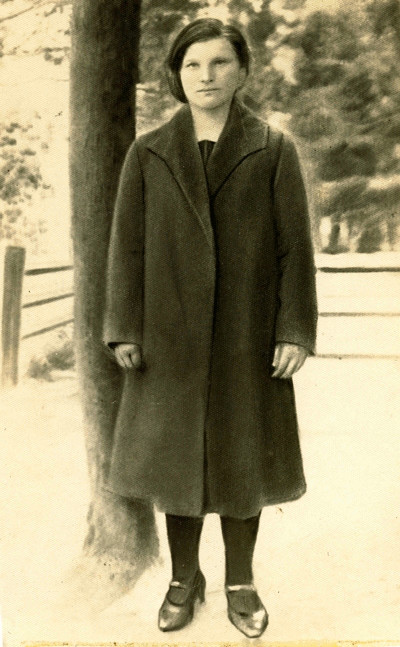
This photograph, taken in Brześć close to where she died, is the only one Urszula has of her mother. Henryka, frustrated with her husband who was late, was not in the best frame of mind to pose for the photographer.
_______________
Urszula’s fond memories of her young mother contrast sharply with those of a stepmother whom her father married in June 1935. A professional cook only two years younger than Michał, and from the same area in Poznań, Maria wore “beautiful clothes not suitable for the country.”
The children quickly noticed she did not help on the farm in the same way their mother did.
Urszula took over the mothering of her little brother and “gentle” older sister. She knows that Michał, with three young children, needed to find another wife. By February 1940, he had another infant daughter, Halinka, and Edek, a few months old.
Michał may have felt the pressure of catching up with farm chores that last winter in Stawy because he had a rare accident: He slashed his thumb with an axe as he was chopping wood and had his arm in a sling when the Soviet soldiers arrived. Urszula, Celina and their step-mother packed as best they could in the limited time they were given before being taken to the railway station, Urszula remembers as Łyszczyce, about 25 kilometres away.
_______________
Siberian incarceration facilities for the Polish families in 1940 and 1941 differed from the worst gulags and prisons in the USSR at the time in that they accommodated entire families whether or not all members worked. Those who did not work received minimum rations—so families with very young and very old members fared worse than those with members who could earn the full quota of daily rations, or money to buy food, if food were available.
The NKVD commandant at Uspieniga deemed Urszula too young to work but her father and sister joined the labourers and cut lumber in the forest. Maria spent her days caring for Zdzisław, Halinka and Edek, until the baby died of malnutrition soon after they arrived.
Polish farm life in kolonia Stawy revolved round food production for home consumption and sale. Life in Uspieniga also revolved around feeding the family but it was all to do with keeping them from starvation. Michał and Celnia’s work usually earned them enough for two plates of soup and two pieces of bread daily, shared by the family. Urszula describes the soup as “mostly from fish heads, so it was all eyes, but it was lovely and we were hungry.”
“When you’re hungry, you do anything and when you’re hungry, you don’t care about your life or yourself. You don’t care at all.”
That hunger led Urszula to grow up quickly. She became a shrewd beggar.
“I was a very cheeky girl. On the way to the forest [the Polish prisoners] walked very close to the river Dwina and in winter my father put me on the river because it was completely frozen and he knew that if the people on the other side could cross it, so could I.
“On the other side there was a village with what I gathered were mostly long-time Russian prisoners. A few used to cross the river to work on our side. Because I was quick and small, I could get across the river without a guard noticing me. Twice a week I would stay there for the whole day. Those people always welcomed me. I pretended I was a fortune teller and did all sorts of things and they always gave me something to take home, a little bit of potato, a few pieces of bread and always they fed me.”
Urszula sneaked back by joining her father and sister as they returned from the forest.
The family’s rations had to stretch further that first summer after Celina hurt herself in an accident on the thawing river. The prisoners pushed piles of cut logs into the river to float north towards Archangielsk and she fell between two. Her injured knee meant Michał was for a time the only one with the official ability to gain extra rations for the family.
“He came home and shared with us but in the meantime I was running here and there and begging.” Urszula had no fear that an NKVD guard would arrest her for leaving the facility and thanks her instinct for keeping her senses heightened to the need to remain hidden.
“When you’re hungry, you do anything and when you’re hungry, you don’t care about your life or yourself. You don’t care at all. Your subconscious tells you that you’ll be dead if you don’t find food, so you are not afraid. I wasn’t afraid of anything.” Urszula spent her days foraging for food and always managed to join her father on his walk back to the facility.
“It was dangerous to collect them because you could drown in the swamp, and two people did…”
“A lot of people died because there was not enough food, like my little brother Edek and a lot of the older people—that’s why I was always begging, so I could support my father a little bit. In the summer we would go for berries, lovely vitamin C, and in the autumn, mushrooms. You can go out into the forest for an hour and come back with all sorts of mushrooms and of course we knew which were good and which were the bad ones.
“That’s why we survived—berries in the summer, mushrooms in the autumn and what they called klukty (cranberries) in the spring. Those cranberries grew in the swamps between the forest and they were very, very sour in the autumn. Then, when the ice was melting, they were so lovely and sweet. It was dangerous to collect them because you could drown in the swamp—and two people did— but you could get them if you were quick. I always ate first, then collected more to share with the family.”
_______________
Life changed again for Urszula nearly two years later. Pamphlets written in Russian appeared in the Uspieniga facility: The Poles could leave and join a Polish army. Hitler had turned on Stalin. The German army had crossed the Molotov-Ribbentrop line in Poland and invaded Russia. Suddenly Stalin needed the incarcerated Poles to help fight the Germans.
“The [Russian] soldiers came to us and said, ‘You can go.’” Urszula estimates that about half the Uspieniga inmates had died by then, leaving about 200 ‘free’ to join the Polish army.
“We definitely didn’t know where we were going but we had the names of places to get to and we had a chance, so we went.” Urszula remembers Czokpak and Czaien as their intended destinations—nearly 4,000 kilometres south-east of Archangelsk in southern Kazakhstan and Uzbekistan.
The Gawronek family joined a group that found and boarded a primitive type of motorless container boat with waterwheel propulsion. It reminded Urszula of a Noah’s ark (barka Noego).
“It was very slow because it had to go against the flow of the river. We went a long way on that bark on our way to Kazakhstan but I don’t know how long it took. I wasn’t thinking about time. We were all so happy to leave that place, so excited to be free.
Glad as they were to have left incarceration… in the barren kolholtz they had to fend for themselves among a local population of subsistence farmers.
“We very seldom talked about any of it. It was in the past and that was my father’s attitude: ‘What is past is past.’ We smiled because we knew we had a good future. I didn’t take much notice of what was happening. I was looking for a better tomorrow.” At the time Urszula was pleased with herself for earning enough through berry foraging around Uspieniga to buy herself a pair of shoes.
Too soon that ‘freedom’ from the forced-labour facility became a nightmare. Once the river became too shallow for the boat, its occupants disembarked and found a train—but that took them only as far as a kolholtz near Uzbekistan.
Glad as they were to have left incarceration, they also left behind their rations. In the barren kolholtz they had to fend for themselves among a local population of subsistence farmers. Urszula’s stepsister, Halinka, died of hunger and Urszula again started begging.
“I felt bad because the Uzbeki people were so poor but I found a herdsman and I was clever because I would knock at the door when I knew they would be eating. I knew they would have to feed me and give me something for my family as well. It was their custom and nearly every day I was knocking at their door. They were so good to me and I was so thankful. I will never forget as long as I live what it was like when we were trying to find the Polish army, travelling here and there through Uzbekistan.” The Uzbeki herdsman gave them some sort of male animal to use as transport.
“It was clean but it died during the journey so we walked, asking people if they knew where the Polish army was and begging… knocking at doors, and begging for a piece of bread.”
The Gawronek family eventually boarded a train that, instead of stopping at Czokpak, took them another route and stopped only when the railway track ended. Someone uncoupled the locomotive and disappeared with it, abandoning the carriages and the occupants, who decided that the silhouettes on the horizon were the Himalayan foothills. A group of young men left to try to find a way through the mountains.
“All but one came back. He must have died. There was nothing around us, no houses, nothing but the hills in the distance on one side and the rest completely empty—except for a patch of watermelons and cabbages. At night we went under the carriages and stole them. We could not cook but it gave us something to eat… we were starving and just surviving… surviving.
“I don’t know why they left us there in the desert.”
“They played beautifully, but when we were asleep they stole everything they could…”
Eventually a delegation walked back along the tracks and presumably found help because another locomotive returned and their zig-zag journey to Czokpak continued. Urszula will never forget that name because she associates it with the gypsies who boarded the train and entertained the passengers with their music. “They played beautifully, but when we were asleep they stole everything they could, including my new shoes! We were so tired, we didn’t feel it at all when they were taking our shoes off our feet.”
The consolation for reaching Czokpak bare-footed was that the Polish army became a reality.
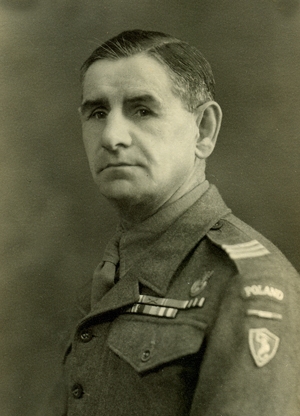
Civilians and soldiers were separated. Celina, Urszula and their father (right) joined the army. “We thought we were old enough to join so we cheated with our age.”
Maria, who had just seen another newborn daughter die, went to the civilian camp with other refugee women and children. Zdzisław, who his father and sisters assumed stayed with Maria, went into an orphanage after he denied knowing her.
Michał left the USSR with the II Polish Army Corps. His daughters stayed together, went with the army to Krasnovodsk, crossed the Caspian Sea to Pahlevi, then were taken to Teheran, and on to Palestine.
Soviets permitted Polish authorities—for a few months—to escort out of the USSR those civilians with family in the Polish army. The sisters met their stepmother for the last time in Teheran. Considering that Maria had not related well with her stepchildren, it may seem strange that the Urszula and Celina made the effort to meet her. Urszula explains it as possibly needing a sense of belonging.
“I didn’t care for her but she was completely alone. I felt very sorry for her. She had lost all her children, one in Siberia and two in different parts of Uzbekistan. She was very ill and told us that they put my brother into an orphanage when he said he could not recognise her. I knew she wouldn’t be able to survive because she was so weak. She gave up living when all her babies died.”
Celina met Maria again at the hospital in Teheran but she died soon afterwards and was buried there. Her father bought her a headstone, which apparently still stands. The sisters found out that Zdzisław was in an orphanage in Isfahan, about 400 kilometres south of Teheran but could not contact him before they left for Palestine. “We thought we lost him.”
_______________
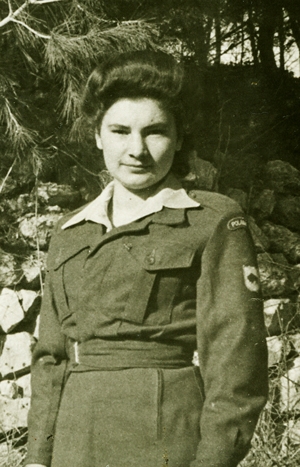
“Our D-Day came when they found out we were too young to join the army,” chuckles Urszula. Polish authorities enrolled the sisters instead in a military cadet school for young Polish women, the SMO or Szkoła Młodszych Ochotniczek (School for Young Army Volunteers). Urszula, here in her SMO uniform, remains grateful that the Polish army accommodated her and about 800 other teenaged girls, and to the soldiers who contributed their wages to support them.
“The soldiers organised us. They gave us everything. They paid for our schooling, our food, everything. We were too young for the army and too old for the orphanages and so they had mercy on us. That was probably the only school of its kind and so we made history. We were there for four years,” says Urszula.
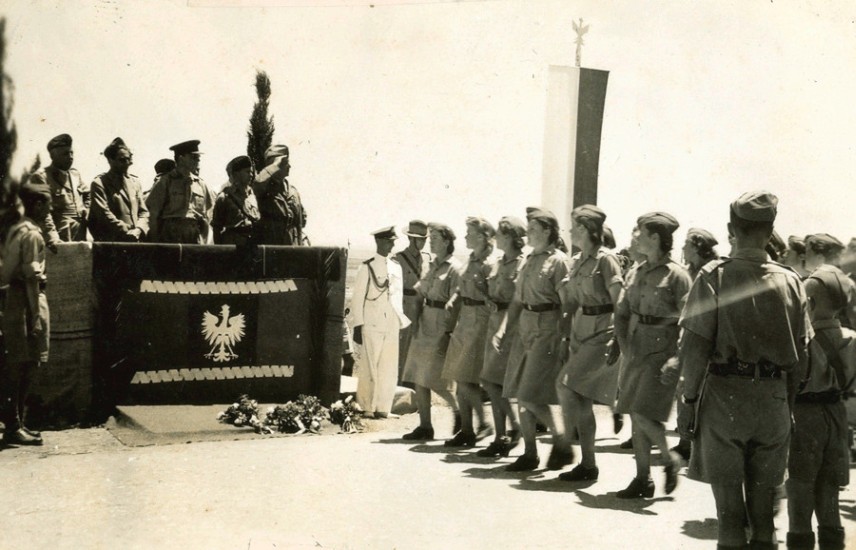
Two of the postcards Urszula bought in memory of Polish Prime Minister General Sikorski’s 1943 visit to the cadets in Palestine—soon before he died in an unexplained aeroplane crash off the coast of Gibraltar. Few people had cameras then and official photographers sold the postcards. Judging from the background, the lower photograph of General Sikorski was taken shortly after the march-past above.
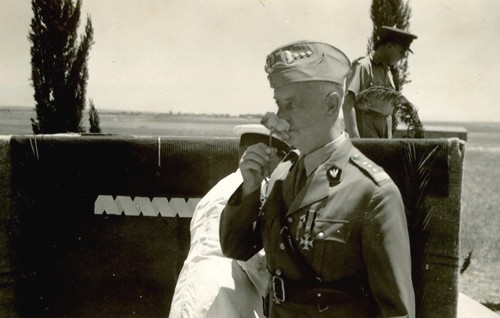
Urszula developed rheumatism in her knees and the SMO sent her for treatment to the mineral springs in Tiberias on the Sea of Galilee.
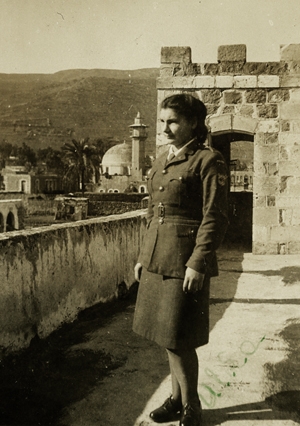
A memento of healing Tiberias. “One [spring] was of salt, another gave off a lot of gas, another was warm. The last hot pool was the worst. It was so hot they would not let you go in alone. I could hardly walk when I got there but after three weeks I was cured.”
Urszula qualified as a teacher and transferred to Egypt with Celina, both still eager to join the II Polish Army Corps in Italy. “I was ready to go but the war was over by then and so I stayed in Egypt, nearly doing nothing. There were quite a few ill soldiers too, and quite a few who had volunteered and waiting to fight, but we were all caught by the end of the war.”
The sisters moved to England with their SMO unit in November 1946.
“We came from such a hot place and suddenly we were in the heaviest snow they had in years. There were no buses, no trains and everything was rationed. You couldn’t buy anything but we were always begging… We definitely knew how to do that… We never came away from the village empty handed.”
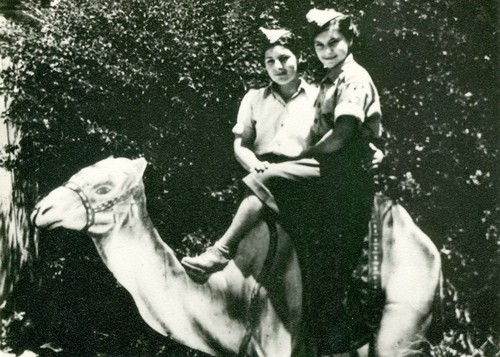
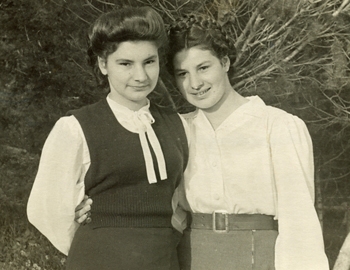
Urszula with Celina on the left still in Egypt and right, in England, six months before being demobilised.
Zdzisław, among the last of the children in Isfahan's Polish orphanages to be accepted for shipment to New Zealand, had arrived in Wellington in November 1944.
“Nobody wanted them but Mr [Walter] Nash came and said, ‘It doesn’t matter if they are sick or little, we will take them all.’ He never said, ‘No, we can’t.’” Urszula has a soft spot for New Zealand’s then-Deputy Prime Minister who visited the orphanage where her brother lived in Isfahan. Mr Nash's offer ultimately extended to more than 700 Polish children and 100 caregivers.
Michał survived the war as a driver with the II Polish Army Corps in Italy and moved to the United Kingdom with the rest of the Corps in late 1946. Although he corresponded with his daughters, he had no time to meet them in England. After he found Zdzisław in Pahiatua he was swept along by the New Zealand government’s family reunification scheme. Michał and 33 other Polish fathers arrived in Wellington on board the ss rangitiki on 16 June 1947.
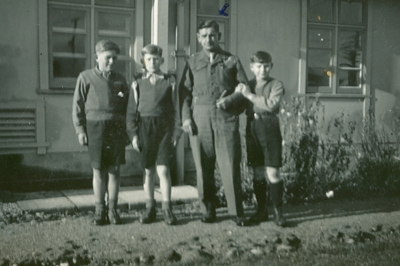
Zdzisław clings to his father’s arm at the Polish children's camp in Pahiatua. If anyone can identify the other two boys, please let us know through our home page.
“We thought we had lost our little brother forever then the Red Cross tells my father that he is in New Zealand. Where is that? We only knew it was green and had a lot of sheep.”
His daughters landed in Wellington almost another year to the day after Michał. They did not receive the same huge welcome as the Pahiatua children in November 1944 but their family reception of two was special in its own way.
“They were waiting for us. We remembered my brother as a little boy and here he was as tall as me! It was a wonderful feeling to be together again.”
Polish post-war parent-refugee-immigrants faced immediate monetary challenges.
“My father came to New Zealand with nothing but a few pounds in his pockets and he was told he would have to straight away pay everything for his child—his education and his boarding. As soon as my father arrived, the Catholic school turned its back on my brother. Those were the rules.
“My father was very lucky to meet an Irish family who helped him. Their name was Doherty and they had five children of their own.”
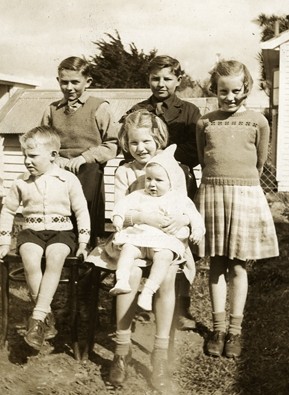
Urszula remains grateful to Jimmy Doherty for the support he gave to her family. Here Zdzisław is in the middle at the back with the Doherty children at their home in Woodville.
The lack of help that new immigrants received in those days, both from the Church and from the government, surprised Urszula. The railways employed Michał immediately in one of the seven jobs set up by the government to build an extension for the Wellington to Woodville railway line over the Rimutaka ranges north of Wellington. Zdzisław boarded with another Irish family and was able to stay at the Catholic school.
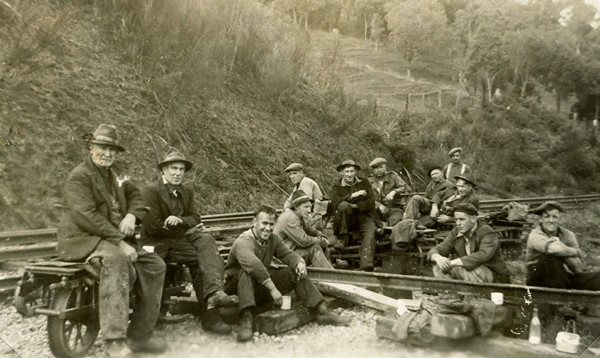
Michał, in the middle at the back in the darker clothes, with fellow workers taking a ‘smoko’ during railway building in 1947.
_______________
By the time Urszula and Celina arrived, Michał had a job as a cleaner in the Ford factory in Lower Hutt and learning English. “It was a happy and a not-happy beginning to our life in New Zealand.”
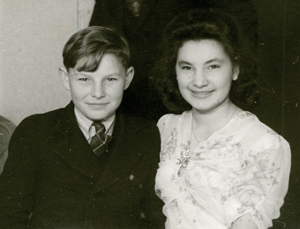
Urszula and Zdzisław shortly after their reunion in 1948.
The Doherty family hosted the sisters for a month before they found lodgings in Wellington and jobs at the Prestige factory making nylon stockings.
“After three months I didn’t feel right there so I went to work for the Customs Department as an accountant.” Urszula’s own lack of English meant she could not use her teacher training, although she did organise a Polish School in Wellington.
“I was lucky to get the job in the Customs Department. I was working on the punching machine, then the tabulator. I was told years later that it was the first computer in New Zealand. We were punching the cards with the holes sending that ship there and that one there. It was quite a job but I enjoyed it. After a year I was married and then became pregnant and even though they let me stay until I was seven months, much longer than usual for a pregnant woman in those days, in the end I had to go.”
Urszula had married Ginter Poczwa, whom she had met in Egypt and with whom she had corresponded for three years.
“I wasn’t very lucky finding a husband when I first got here. I was probably too choosy… that one had eyes too big… that one a nose too big… it was always something—and then my sister reminded me what a lovely boy Ginter was. I asked him to join me. He came and we lived happily. He was a good one.”
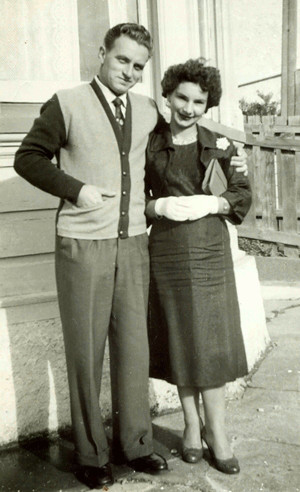
Urszula and Ginter Poczwa in late 1949 outside the first house they bought in Rolleston Street, Wellington, close to the Dom Polski (Polish House) in Newtown.
Ginter was one of the Poles forced to join the German army during World War 2. He came from Śląsk (Silesia), in 1939 near Poland’s south-western border with Germany.
“All those people could speak German as well as Polish so as soon as the Germans invaded they went to his house and said that being 18 years old, if he didn’t join the German army, they would shoot his family.”
“Once the Germans were losing the war, he was taken as a prisoner and sent to Egypt. He proclaimed himself a Pole and they gave him a Polish uniform and the same rank that he had in the German army. Some Poles here couldn’t understand that and though it seemed he volunteered for the German army, he was forced into it. When he was taken prisoner by the English soldiers, they straight away asked who was a Pole. He stepped forward and they took him into the Polish army. That’s why I met him in Egypt—he was waiting to fight the Germans but the war was over. It was the same for him as it was for me.
“The one thing the Germans did correctly was send most of the men from Śląsk to the eastern front, because they knew they would fight the Russians but wouldn’t fight the Polish in the west. It was a good thing they did for the Polish boys in their army, not letting them fight brother against brother. A lot of the Polish people in New Zealand were from [eastern Poland] and couldn’t understand that at first but my father was also from that area [western Poland] originally so he and my husband had the same kind of history.”
Michał lived with them and so did Zdzisław during school holidays. Urszula and Ginter bought a five-bedroomed house in Petone to accommodate their growing family as well as the borders Urszula took in to supplement their income while she looked after their four children. Celina, who had nine children, lived nearby in Neanae. Sisters and cousins remained close.
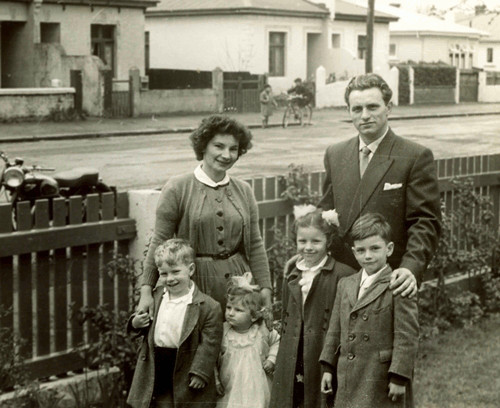
Urszula and Ginter with their children, from left, Zygmunt, Aleksandra (Oleńka), Barbara and Henryk, born from 1950 to 1955, in their Petone garden.
For two years, the Poczwa house accommodated 12 people. The borders, young men from the Pahiatua camp, had jobs in the area.
“I was only a few years older than them but they still called me ‘Mum’ because I cooked for them and did their washing, everything.” Urszula cut down the number of borders once she and Ginter had saved enough for the deposit on another house in Merton Street in Upper Hutt.
Ginter worked on the wharves. One day he received a job offer on a ship going to England. Several stewards had absconded, the ship needed help in the kitchen, and Ginter felt he had to take advantage of a free passage to see his family in Europe.
In his absence Urszula made lampshades and had just saved £100 when she received a desperate telegram from her husband to send him that exact amount for his return passage: More people wanted to go to New Zealand than return to Europe and he could not find another job on a ship home.
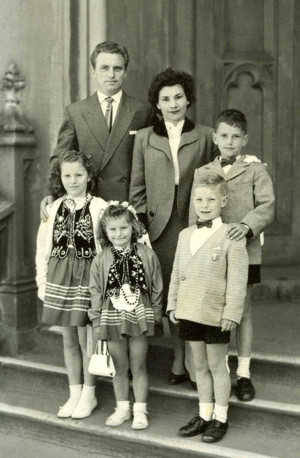
Ginter’s father, Maks, made Henryk’s and Zygmunt’s jackets and Urszula made Barbara and Aleksandra’s dresses in this photograph, taken around 1959 on the steps of St Mary of the Angels in Wellington, the same church where Urszula and Ginter married in 1949.
Their children’s education motivated Urszula and Ginter to work.
“I said to them, ‘They can chop off your hands or your legs but what you’ve got in your head, that’s yours.’ That’s why we pushed them to study.”
Urszula dreamt of owning her own business. She decided on a delicatessen and arranged premises and a loan from the bank, and organised details such as the sourcing and delivery of imported goods—only to find that she was not allowed to sign any official papers. Under New Zealand law in 1964 her husband had that privilege.
Unimpressed, she had to comply.
Urszula’s days started at 4am making pies ready for sale by 8am. A month later she found a private bakery to take over that baking and provide other fancy breads. She remembers Hutton’s hams from Masterton as “the best” and took pride in providing difficult-to-obtain speciality goods.
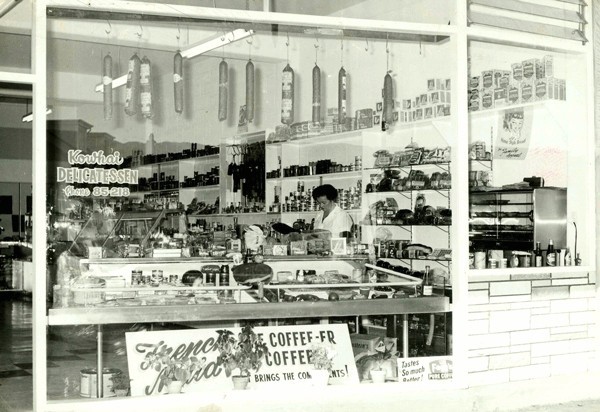
Urszula in her element behind the counter at Kowhai Delicatessen, Main Road, Upper Hutt.
Urszula loved the shop but Ginter did not and in 1979 she sold it to a Dutch couple. The introduction of supermarkets eventually put the new owners out of business.
“That was the killer for all the shops in the area,” says Urszula, satisfied that her venture had been viable long enough to pay for a Catholic education for their children, and later university.
Michał retired in 1960 and died in 1971 “at home, as was his wish.”
Zdzisław married and had two children. When he died in 2001, his last words to Urszula were: “I know you are my sister, but you are my mother too.”
Ginter died in 2007. Zygmunt Poczwa died suddenly in 2009 and Celina in 2013.
_______________
Urszula’s only trip to Poland in 1980, with Ginter, was bittersweet in that she could not go back to her birthplace. In 1945 the Bug river became Poland’s eastern boundary and, although Stawy lay only two kilometres east of the Bug, then-communist Byelorussian SSR did not allow her entry.
Their visit coincided with the first strikes that set the stage for the downfall of communist-ruled Poland. Within a country of political upheaval, they felt lucky to have secured a berth out of Poland on the newly-built cargo ship Inowrocław.
“It was my dream to go by ship from Gdańsk to London via the canals of northern Poland and Germany.”
Urszula took the chance of combining the Poland trip with a reunion of the SMO in London. The Inowrocław, which accepted only 12 non-crewing passengers, had no guest dining room and Urszula and Ginter made their own meals.
“There was a huge fridge for us to use and it had everything, from beautiful salamis, frankfurters, bread… Name it, it was there. I couldn’t believe it. This ship came from hungry Poland where Russia took everything from them and yet here there was everything to eat that you could imagine. People from Poland would not have believed it.”
On 14 August 1980 the Inowrocław seemed about to leave the then-called Lenin Shipyard when the deafening sound of a whistle startled them.
The ship’s motors stopped.
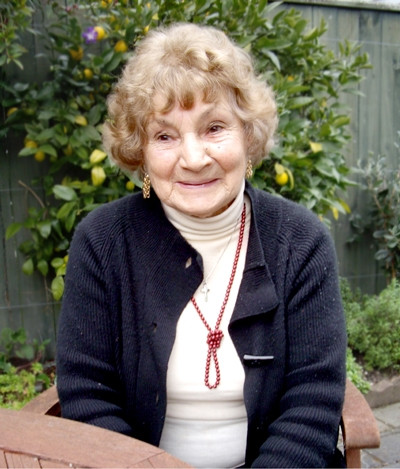
“It was the first time I’d been on such a large ship and the first time I’d been to Gdańsk. I was so excited, then suddenly the workers stopped what they were doing, sat down against the walls, and just talked among themselves.
“We were so worried because we thought we would never get to London on time but after an hour the whistle stopped and it all became normal again. I was impressed with their discipline.”
Urszula and Ginter left Poland on the day that 17,000 workers went on a strike that two weeks later later developed into the first non-communist trade union in Poland—Solidarność (Solidarity). Urszula and Ginter did not know then that the strikers were protesting were against increased food prices, or that it would take another 10 years for head of the strike committee, Lech Wałęsa, to be elected the first president of a post-communist Poland.
That day on the ship in Gdańsk, Urszula felt a yoke being lifted from her.
Forty years after being on the receiving end of Soviet socialist plans for ethnic cleansing of Poles, Urszula Gawronek Poczwa left the country of her birth light-hearted and knowing she had witnessed a positive revolt against the same regime.
© Barbara Scrivens, 2015
Updated September 2017
APART FROM THE LAST, ALL PHOTOGRAPHS ARE FROM THE POCZWA COLLECTION.
THANKS TO THE NORTH AUCKLAND RESEARCH CENTRE IN THE TAKAPUNA LIBRARY FOR THE LOAN OF AUDIO RECORDING EQUIPMENT.
ENDNOTES:
- 1 - This was facility number 45 in the Archangielsk district, also known as Ujma.
- 2 - Pani Urszula was using the term “Siberia” in the iconic and not literal sense. Geographical Siberia is east of Archangelsk, on the eastern side of the Ural mountains. The Archangielsk district is in northern Russia. These days the town Uemskij emcompasses the Uspieniga forced-labour facility, about 20 kilometres south of Archangielsk. The next facility south, known in Polish as Koskowo and another 15 kilometres south is now called Khorkovo.
- 3 - http://sanatatur.ru/forum/viewtopic.php?f=50&t=9602&page=all.
- 4 - For further reading about the Polish-Soviet War, we suggest:
D’Abernon, Viscount, The Eighteenth Decisive Battle of the World, Warsaw 1920, Hodder & Stoughton, London, and
Davies, Norman, White Eagle Red Star: The Polish-Soviet War 1919-1920 and the Miracle on the Vistula, first published in 1972 by Macdonald & Co. (reprinted in 1983 by Orbis Books and in 2003 by Pimlico).
